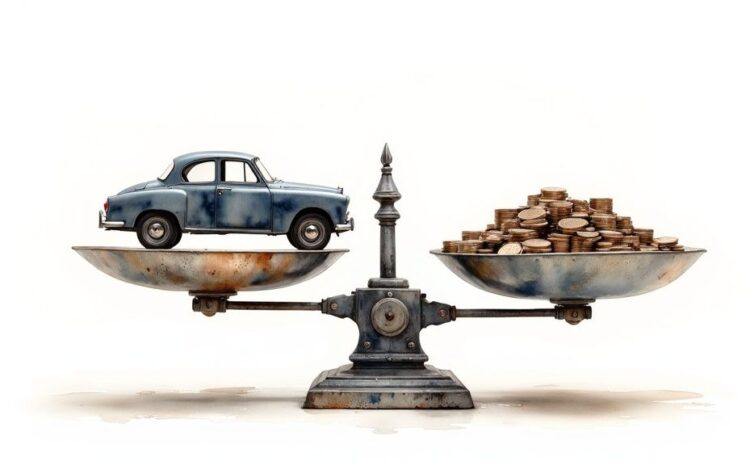
UK Scrap Price for a Car Explained
Ever wondered what your old car might be worth as scrap? In the UK, the average price you’ll get for scrapping a car hovers around £220 to £230. Of course, that’s just a ballpark figure. The final offer really depends on your specific vehicle's weight, make, and model.
What Is the Average Scrap Price for a Car?
Before we get into the nitty-gritty of what your car is worth, it helps to understand the bigger picture. First off, what even counts as a scrap car? This handy article gives a great explanation of what is a scrap car. The scrap metal market is a bit like the stock market—it’s constantly on the move, driven by global supply and demand. That means a quote you get today could be slightly different tomorrow.
The market has been a perfect example of this recently. In the first quarter of 2025, the average scrap price for a car landed at about £227. After a small dip to £223 in January, prices bounced back, climbing to £230 in February and staying strong at £229 in March. You can find more details on these trends over at ATF Professional.
Estimated Scrap Value by Vehicle Type
So, what's the single biggest factor that determines your quote? It almost always comes down to your car's weight. Heavier cars have more metal, and more metal means more value for a scrap yard. It’s that simple. Our guide on how much scrappage your car is worth goes into this in much more detail.
To give you a clearer idea, here's a look at what you might expect based on the type of vehicle you have.
Estimated Scrap Value by Vehicle Type
| Vehicle Type | Typical Weight (Tonnes) | Estimated Scrap Price Range |
|---|---|---|
| Small Hatchback (e.g., Ford Fiesta) | 0.8 – 1.2 | £150 – £250 |
| Family Saloon (e.g., Vauxhall Insignia) | 1.3 – 1.7 | £230 – £330 |
| Large 4×4/SUV (e.g., Land Rover Discovery) | 1.8 – 2.5 | £300 – £450+ |
Think of this table as a rough guide. While weight is king, the final scrap price for a car also hinges on a few other key details, which we'll dive into next.
The Key Factors That Determine Your Car's Scrap Value
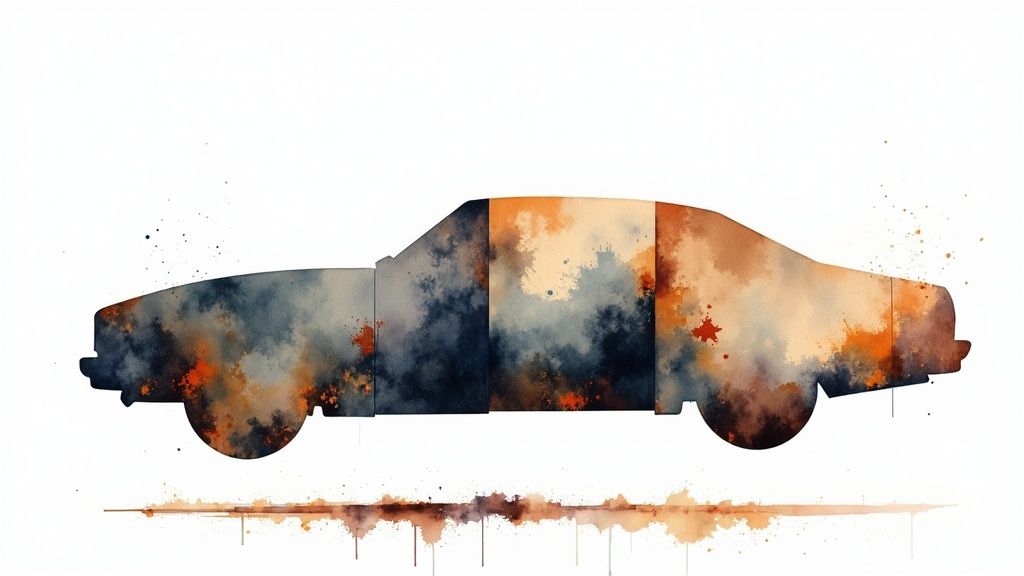
Ever wondered how a scrap dealer comes up with a price for your old car? It might seem like a number plucked from thin air, but there’s a solid logic behind it. In reality, four main factors come into play, and understanding them gives you a much clearer idea of what your vehicle is actually worth.
First and foremost, it’s all about the weight. At its core, a scrap car is a big lump of metal. The heavier it is, the more raw material there is to recycle. It’s that simple. A chunky Land Rover Discovery has a lot more steel and aluminium than a little Ford Fiesta, so its baseline scrap value will always be higher.
Your Car's Make, Model, and Condition
You might be surprised to learn that the make and model also make a difference. Dealers are always on the lookout for popular cars like a Vauxhall Corsa or a Ford Focus. Why? Because the demand for their used parts is huge. If a scrapyard knows they can quickly sell the alternator, starter motor, or wing mirrors, they might just sweeten the deal for the whole car.
Now, what about the car's condition? This is where a common myth trips people up. Many owners worry that a crumpled wing or a few deep scratches will tank their quote. The truth is, for a scrap valuation, cosmetic damage is mostly background noise.
A dealer is far more interested in whether the major components are still there. As long as the engine, gearbox, and catalytic converter are present, the car holds its value. The price is tied to the metal and the key parts, not a flawless paint job.
This means a car that’s seen better days cosmetically can still fetch a very respectable scrap price for a car, provided it's complete under the bonnet.
How Your Location Plays a Part
Finally, your postcode genuinely matters. Scrap metal prices aren't uniform across the UK; they shift based on local supply and demand. A yard in a remote part of Scotland, for instance, has higher costs for transporting processed metal than one on the outskirts of Birmingham. Those operational costs can sometimes be reflected in a slightly lower offer.
This is exactly why it pays to shop around and get a few different quotes before settling on one.
Uncovering the Hidden Value in Car Components
When a scrap dealer looks at your old car, they don't just see a lump of steel on wheels. They see a collection of valuable materials, each with its own price tag that adds up to your final scrap price for a car. Think of it as a small, mobile mine waiting to be processed.
For instance, your car's wiring is a fantastic source of copper, while the engine block and wheels are typically made from aluminium. These metals are all separated and sold on, but their market prices are worlds apart. As of early 2025, premium Dry Bright Copper might fetch around £5.40 per kilogram. Compare that to mixed aluminium at about £0.50 per kilogram, or stainless steel at a modest £0.35 per kilogram. You can dig deeper into how current metal prices influence scrap car value to see how these markets fluctuate.
The table below gives you a better idea of how the different metals stacked inside your vehicle compare.
How Different Metals in Your Car Compare in Value
| Metal Type | Typical Price per Kilogram (£) | Commonly Found In |
|---|---|---|
| Dry Bright Copper | £5.40 | Electrical wiring, alternators, starter motors |
| Mixed Aluminium | £0.50 | Engine blocks, wheels, radiators |
| Stainless Steel | £0.35 | Exhaust systems, trim details |
As you can see, it's not a one-size-fits-all valuation; the specific materials in your car play a huge role.
The Most Valuable Part of Your Car
While every bit of metal adds to the pot, one component single-handedly makes the biggest difference to your quote: the catalytic converter.
This unassuming part of your exhaust system is an absolute treasure trove. It contains a ceramic honeycomb coated with tiny amounts of three incredibly rare precious metals:
- Platinum
- Palladium
- Rhodium
These metals are worth a fortune, which is why your catalytic converter is the most prized component for recyclers. A scrap dealer will always check it's still there—if it's missing, you can expect the offer to drop significantly.
The image below gives you a sense of how scrap car prices have been trending, largely driven by the value of all these recycled materials combined.
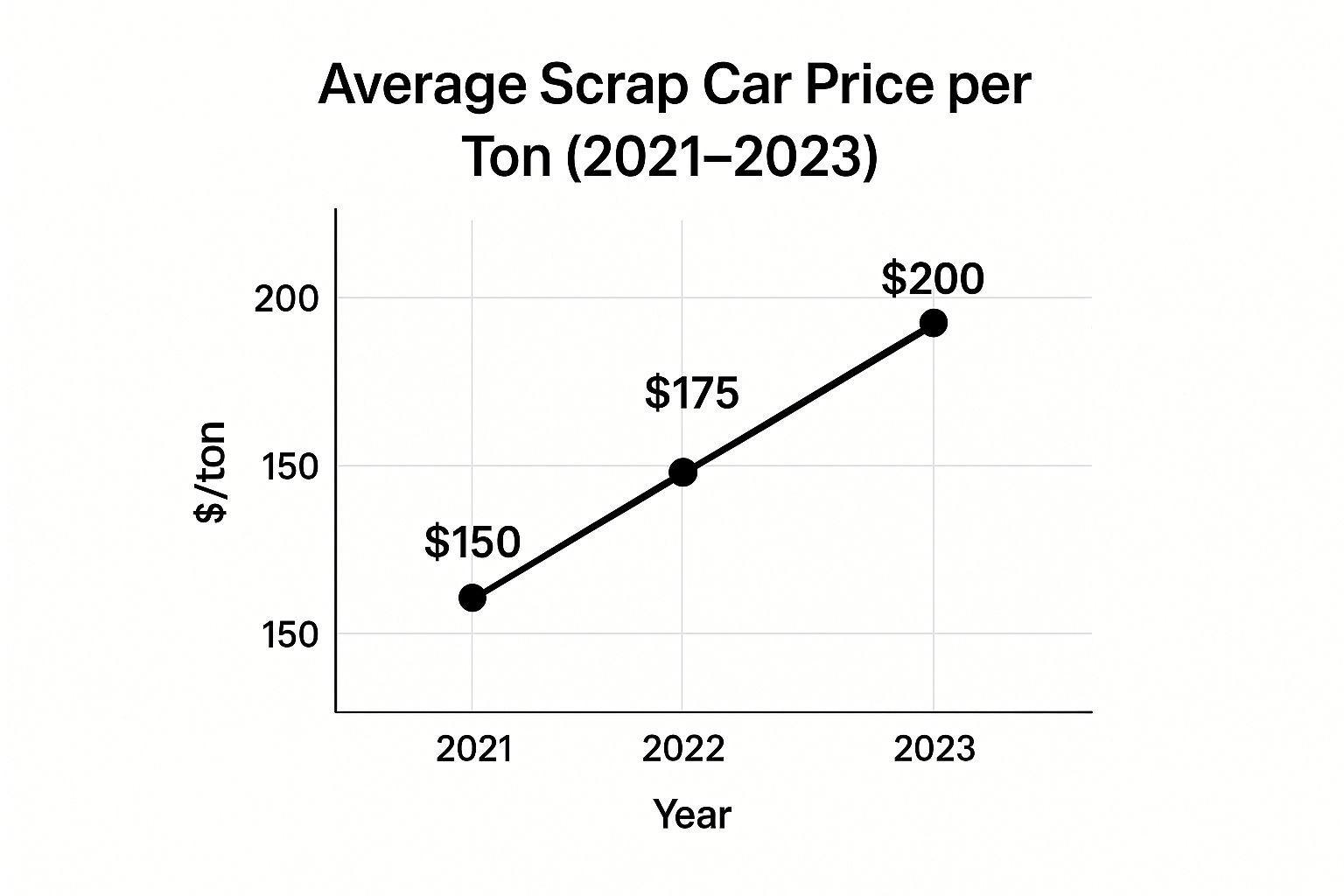
This graph clearly shows a steady climb in what you can expect to get per tonne, highlighting just how much the demand for recycled metals has grown.
Key Takeaway: A scrap yard works out your quote based on two main things. First is the raw value of the metal by weight. Second, and often just as important, is the value of any salvageable parts they can sell on—with the catalytic converter sitting right at the top of that list.
Why Do Scrap Metal Prices Constantly Change?
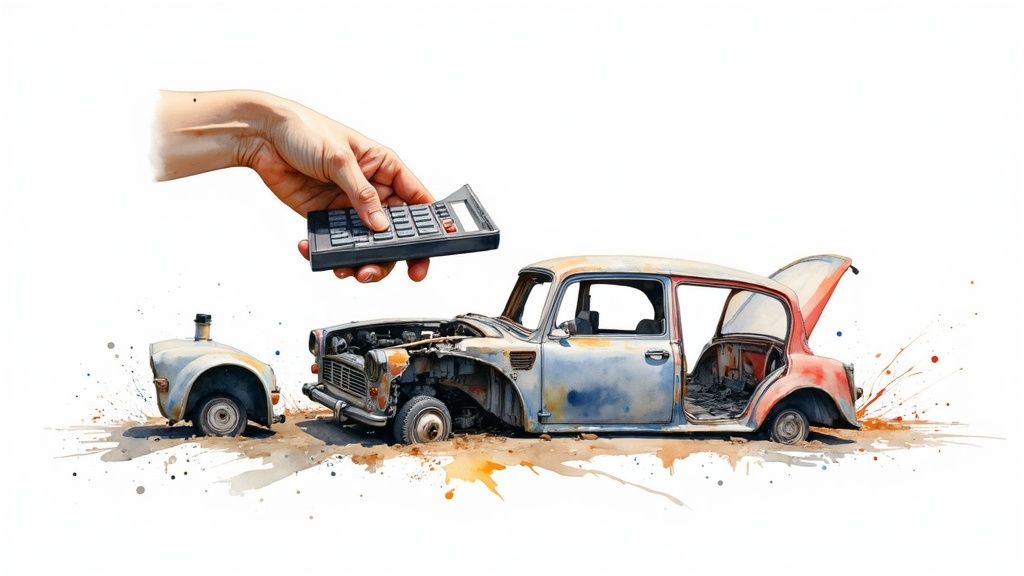
Ever wondered why the scrap price for a car you’re quoted one week can be completely different the next? It’s a common question, but the answer isn't down to your local dealer just being fickle. It’s all tied to the massive, constantly moving global market for recycled metals.
The best way to think about it is to compare scrap steel to other major commodities, like oil or even coffee. Its value is purely a reflection of global supply and demand. When industrial powerhouses like China and India are in a building boom, their demand for steel skyrockets. This makes recycled metal a much hotter commodity, and that upward pressure pushes up the price you’ll be offered right here in the UK.
Of course, the opposite is also true. If global manufacturing slows down, the need for scrap metal cools off, and prices will inevitably dip. It’s a classic balancing act, swayed by everything from worldwide economic health to new industrial projects and even international politics.
How Global Events Affect Your Local Quote
It might seem strange, but big economic decisions made thousands of miles away can directly affect the cash in your pocket. Things like new trade tariffs or international agreements can change the entire flow of scrap metal around the world in an instant, leading to sudden shortages or gluts in the market.
A perfect example of this happened back in April 2025. Scrap vehicle prices took a hit, dropping by about £10 per tonne. The main cause? The United States had just brought in new import tariffs on scrap metal and car parts.
That single decision reduced American demand for UK scrap, which created a surplus right here at home and forced domestic prices down. It's a clear illustration of how the global stage dictates the final offer you'll receive. You can get a deeper dive into how global events affect scrap prices over at Scrap Local.
Once you understand these bigger market forces, the day-to-day price changes start to make a lot more sense. It also shows why timing can sometimes make all the difference in getting the best possible price for your old car.
How to Get the Best Price When Scrapping Your Car
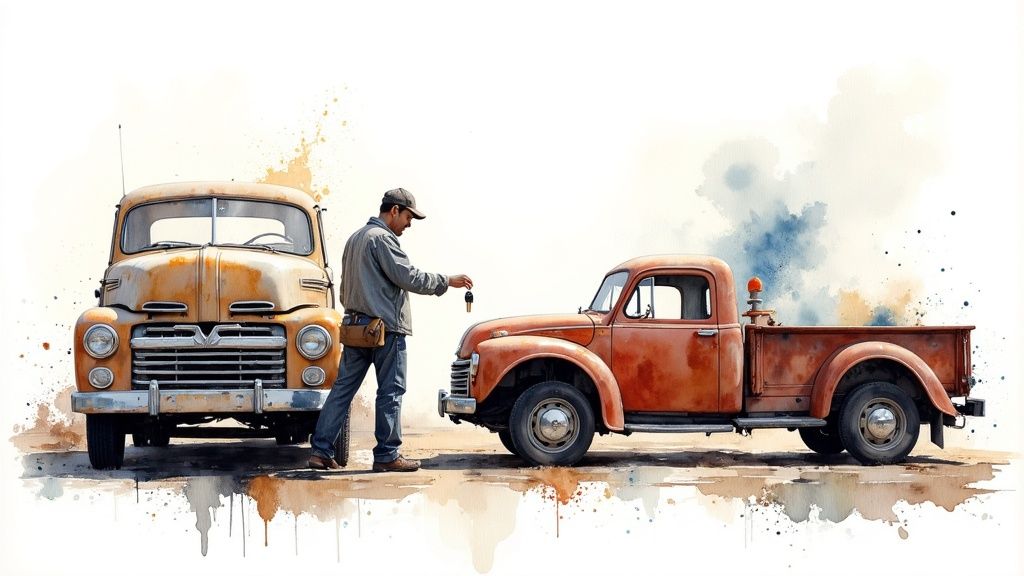
Understanding what your old car is worth is one thing, but actually getting that top price takes a bit of strategy. A few simple steps can make a real difference to your final payment and keep the whole process legal and hassle-free.
The first, and most important, rule is to shop around for quotes. Don't just jump at the first offer that comes your way. Get in touch with at least three different Authorised Treatment Facilities (ATFs) to get a proper sense of the going rate. This one action puts you in control and makes it much easier to spot a fair deal from a lowball offer.
Preparing for a Smooth Transaction
Once you've got a few quotes lined up, it's time to get the car and the paperwork ready for collection. Being prepared doesn’t just speed things up; it also protects you down the line.
Part of this responsibility means being mindful of what’s inside your car. It’s crucial to understand how to safely manage hazardous waste to ensure everything is disposed of correctly and legally.
Here’s a quick checklist to run through before they arrive:
- Find Your V5C Logbook: This document is essential. You'll need to fill out Section 9 and post it to the DVLA.
- Clear Out Your Stuff: Check everywhere—the glove box, under the seats, the boot—for any personal items you might have forgotten.
- Leave the Car Intact: The quote you received is for a complete vehicle. If you start pulling out the battery or tyres, the scrap price for a car you're offered will drop.
Crucial Tip: Never walk away without getting a Certificate of Destruction (CoD). This is your official DVLA proof that the car is off the road for good. Without it, you could be on the hook for future road tax or fines.
By being organised, you can make sure the entire process goes off without a hitch. For a deeper dive, have a look at our complete guide on how to scrap your car for the best value. Following these pointers ensures you get a fair price and tick all the legal boxes.
Your Top Questions About Scrapping a Car, Answered
When you're ready to say goodbye to your old car, a few last-minute questions usually pop up. Sorting these out beforehand makes the whole process a lot smoother and ensures you get the best scrap price for a car without any hiccups. Let's walk through some of the most common queries we hear.
First up, paperwork. What if you can't find your V5C logbook? Don't panic. While it's always easier with it, you can still scrap your car without one. You'll just need to show some photo ID and proof of address. The crucial step is to write to the DVLA and officially let them know you're no longer the registered keeper.
Payments, Parts, and Final Proof
Another point of confusion is how you'll get paid. Many people ask if they can get cash in hand. The answer is a firm no. Thanks to the Scrap Metal Dealers Act 2013, cash payments for scrap cars are illegal. This was brought in to clamp down on metal theft, so any reputable dealer will pay you by bank transfer or cheque.
This often leads to another thought: "Should I take some parts off to sell separately?" Unless you're a seasoned mechanic who knows how to remove and sell a catalytic converter for a good price, it's best to leave the car as it is. Your quote is for the complete vehicle, and if you start removing bits, the dealer will simply lower their offer.
The single most important piece of paper you’ll get is the Certificate of Destruction (CoD). This is your official proof from the DVLA that the car has been legally scrapped and is no longer your responsibility. Never, ever finalise the deal without getting a CoD from an Authorised Treatment Facility.
Finally, with so many options out there, who should you actually sell to? Taking a moment to understand who buys scrap cars and how to spot a legitimate service is your best first move. Arm yourself with the right questions, follow these simple guidelines, and you can scrap your car with complete peace of mind, knowing you’ve got a fair price and all the legalities are covered.
Ready to get a fair and competitive quote for your vehicle? Fast Scrap Car offers a transparent, hassle-free process with free, same-day collection across London and Surrey. Get your instant quote now at https://fastscrapcar.co.uk.
